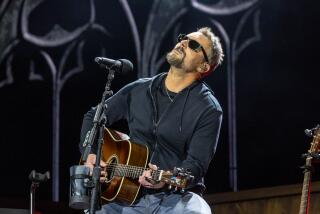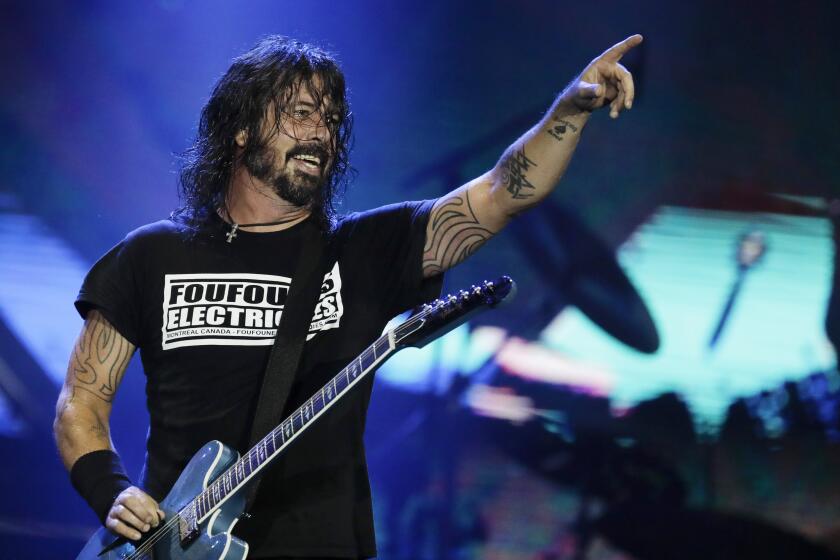JAZZ REVIEW : Fountain, Ade and Sanborn Add Eclecticism to Playboy Fest
OK, let’s be honest about this. The hit acts of the Sunday session of the Playboy Jazz Festival were Pete Fountain, King Sunny Ade and David Sanborn.
Not exactly the politically correct jazz choices, but there’s no denying the fact that Fountain’s recycled Dixieland, Ade’s African pop and Sanborn’s contemporary funk captivated the audience far more than the mainstream jazz of Elvin Jones, Joe Williams and the Count Basie Orchestra.
But let’s look at the upside. Fountain, Ade and Sanborn represent three strikingly different aspects of the jazz experience, and, if nothing else, their presence on the program illustrated the colorful eclecticism of the contemporary jazz scene.
To be sure, Fountain’s jaunt through a collection of Dixieland chestnuts had less to do with the enduring creative value of the style than it did with its commercial appeal, but the performance of his seven-piece band was bright and spirited--a real door-opener for neophyte jazz fans.
Ade’s music also has its commercial qualities, but his percussion-heavy group performed their propulsive rhythms, call-and-response vocals and infectious melodies in a fashion that clearly underlined the primal connections between African music and the roots of jazz.
And Sanborn did what he does best--spin out a series of riff-based solos over hypnotically repetitive funk rhythms. Musically limited? You bet, but perfectly in tune with an audience eager to respond to some easy R&B-styled; dance rhythms.
Few of the mainstream groups fared quite as well. In the case of the Basie band, which was led by Frank Foster, the problem of audience interaction was compounded by that old bugaboo--lousy audio. The utter mystification that seems to possess the Playboy Festival audio engineers (who are not the regular Bowl audio crew) when they must deal with a big band once again took over, and both the subtle sounds of the Basie rhythm section and the power chords of the brass were sacrificed to a sound mix more appropriate for a rock group. Too bad, because the band played with fine-spirited enthusiasm, while backing Joe Williams, as well as while roaring through such classics as “Whirly Bird” and “April in Paris.”
Williams’ solo set, performed with a smaller rhythm section, provided several of the day’s authentic jazz moments. Arguably one of the best singers in the world, the 75-year-old Williams balanced shouting blues numbers with spare, remarkably subtle (given the venue) readings of tunes such as “Tenderly.” His brief exchange of riffs with drummer Paul Humphrey was one of the festival’s finest small musical gems.
Elvin Jones, another jazz veteran, showcased a group that sputtered and stammered for the first half of its program. Heavily reliant upon the surging musical energy of trombonist Delfeayo Marsalis, the ensemble finally came to life when Jones exploded with a trademark drum solo blazing with the multilayered rhythms for which he is justifiably famous.
Guitarist Russell Malone’s opening performance was less effective, wasting too much time on an overcooked simulation of B. B. King, and not enough on his own impressive, straight-ahead improvisations. Marcus Roberts’ piano trio was similarly unfocused--a blend of standards and originals in which the leader’s rapid-finger technique too often became the center of attention.
Tito Puente, relegated to the audience-departing closing spot on the bill, nonetheless generated some of the event’s most riveting jazz, powerfully vitalized by a guest lineup that included flutist Dave Valentin, pianist Hilton Ruiz, trumpeter Charlie Sepulveda and congalero Mongo Santamaria. It was a splendid climax for a festival whose only real failure--again--was its continuing reluctance to honor the role of women in jazz.
More to Read
The biggest entertainment stories
Get our big stories about Hollywood, film, television, music, arts, culture and more right in your inbox as soon as they publish.
You may occasionally receive promotional content from the Los Angeles Times.










